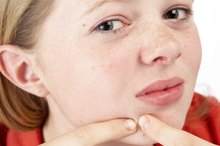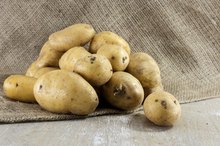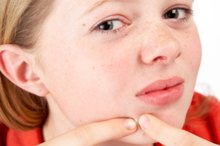What does fact checked mean?
At Healthfully, we strive to deliver objective content that is accurate and up-to-date. Our team periodically reviews articles in order to ensure content quality. The sources cited below consist of evidence from peer-reviewed journals, prominent medical organizations, academic associations, and government data.
The information contained on this site is for informational purposes only, and should not be used as a substitute for the advice of a professional health care provider. Please check with the appropriate physician regarding health questions and concerns. Although we strive to deliver accurate and up-to-date information, no guarantee to that effect is made.
Grapes & Acne
Acne is one of the most common issues affecting the skin, afflicting more than 17 million adolescents and adults in the United States, according to Henry Ferdowsian, MD, MPH, of the Physicians Committee for Responsible Medicine. Like many chronic diseases of the skin, acne is influenced by the foods in your diet. Grapes are one food that might affect acne development.
Diet and Acne
The typical Western diet -- rich in refined carbohydrates and low in antioxidants and healthy fats -- is largely responsible for high rates of acne found in developed countries, reports a review paper published in the December 2002 "Archives of Dermatology." The paper adds that a trio of factors that induce acne -- oxidation, activity of sweat glands and insulin levels -- are largely influenced by dietary factors 1.
Antioxidants
Are Brown Rice and Sweet Potatoes Good for Acne?
Learn More
Oxidation is a natural by-product of your body's energy-producing pathways. While low levels of oxidation are benign, high levels of oxidation can increase sweat gland activity and clog pores, notes the book "The Dietary Cure For Acne," penned by nutrition scientist Loren Cordain, PhD 1. Like all fresh fruit, grapes are a rich source of antioxidants -- compounds that can significantly reduce oxidation. Grapes contain a powerful antioxidant known as resveratrol -- the compound in red wine that promotes health. Opt to eat the skin of grapes as this is where most of the fruit's antioxidants are found.
- Oxidation is a natural by-product of your body's energy-producing pathways.
- Grapes contain a powerful antioxidant known as resveratrol -- the compound in red wine that promotes health.
Glycemic Load
Different carbohydrate-rich foods influence your body's insulin levels in different ways. Some foods cause a ripple of insulin release, while others induce a massive spike in blood insulin. How much a given food impacts insulin is known as the glycemic load. High glycemic load foods promote large amounts of insulin release, while low glycemic load foods don't result in a rapid insulin rise. According to Henry Ferdowsian, MD, MPH, a high glycemic load diet promotes acne development. Grapes are a high glycemic load food. Their glycemic load of 8 is significantly higher than that of other fresh fruits, such as apples and pears.
- Different carbohydrate-rich foods influence your body's insulin levels in different ways.
- High glycemic load foods promote large amounts of insulin release, while low glycemic load foods don't result in a rapid insulin rise.
Considerations
Beta Carotene for Acne
Learn More
Although not dangerous, acne should be treated under the supervision of a dermatologist. No study has investigated the effects of grapes on acne development. In addition to following a healthy diet, you can reduce acne by washing your face twice daily, reducing stress and limiting your intake of dairy products.
Related Articles
References
- The Dietary Cure For Acne; Loren Cordain, Ph.D.
- SkinTherapyLetter.com: Does Diet Really Affect Acne?
- Harvard University: Glycemic Index and Glycemic Load for 100+ Foods
- American Academy of Dermatology. Acne: Who gets and causes.
- American Academy of Dermatology. Adult acne.
- Zaenglein AL, Pathy AL, Schlosser BJ, Alikhan A, Baldwin HE, Berson, DS, et al. Guidelines of care for the management of acne vulgaris. J Am Acad Dermatol. 2016;74(5):945-73.e33. doi:10.1016/j.jaad.2015.12.037
- Ju Q, Tao T, Hu T, Karadağ AS, Al-khuzaei S, Chen W. Sex hormones and acne. Clin Dermatol. 2017;35(2):130-137. doi:10.1016/j.clindermatol.2016.10.004
- Dréno B. What is new in the pathophysiology of acne, an overview. J Eur Acad Dermatol Venereol. 2017;31 Suppl 5:8-12. doi:10.1111/jdv.14374
- Juhl CR, Bergholdt HKM, Miller IM, Jemec GBE, Kanters JK, Ellervik C. Dairy intake and acne vulgaris: A systematic review and meta-analysis of 78,529 children, adolescents, and young adults. Nutrients. 2018;10(8) doi: 10.3390/nu10081049
Writer Bio
Ryan Devon is a registered dietitian with a Master of Science in nutrition and health promotion from Simmons College. He starting writing in 2010, specializing in weight management and eating-disorder science.









